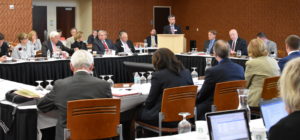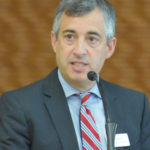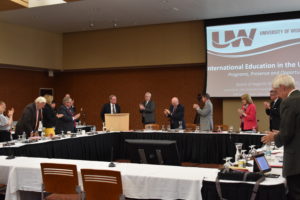MADISON – The University of Wisconsin System Board of Regents voted to approve a $6.2 billion annual operating budget for 2017-18 at its meeting Thursday in Madison.
In introducing the budget, UW System President Ray Cross reiterated the need to consider the value students derive from a high-quality college experience, and whether the UW’s colleges and universities have the resources they need to deliver a first-class education that prepares students for success in work and life.
“Also critically important are the broader benefits that all of Wisconsin derives from having an educated workforce and citizenry,” Cross said. “For that, we want to ensure UW institutions retain a robust capacity to serve as an economic engine for the state.”
Cross identified four key takeaways of the budget:
- State funding increased by 3.7%;
- Resident undergraduate tuition is frozen for fifth consecutive year;
- Limited segregated fee increases; and
- Program revenue balances are projected to further decline.
- See
Other budget highlights:
- GPR and tuition combined create an instructional operating budget of $2.57 billion.
- In accordance with the state’s biennial budget, the university’s annual operating budget includes a freeze on tuition for resident undergraduates at 2012-13 levels. Non-resident, international and graduate tuition increases approved by the Board in December 2016 will produce $24.2 million in anticipated new revenue.
- Total allocable and non-allocable segregated fees will see an average $32 increase (2.6%) at four-year institutions. Much of that increase is due to major projects previously approved by the Board of Regents and the State as well as student-supported projects.
- Room and board rates at the four-year institutions will increase by an average $187 (2.6%) with those increases primarily due to new and renovated residence halls, facility maintenance projects, and rising food costs.
Vice President for Finance Sean Nelson also noted that the Joint Committee on Finance had previously approved a $5.7-million increase in Wisconsin Grant funding for UW students – the first state financial aid increase since 2010-11. This funding goes to the Wisconsin Higher Educational Aids Board, not the UW System.
UW Growing International Education
With international awareness and preparation for the global environment identified as key initiatives in 2020FWD, the UW System’s strategic framework, UW-Oshkosh Provost Lane Earns led a full-Board discussion of the diverse and growing international education opportunities in the System.
Earns’ presentation addressed the importance of international education, examples of partnership opportunities, information about existing umbrella agreement frameworks in the UW System, and an update on international investments in Wisconsin by potential partners.
More than 9,000 international students – representing 132 different countries – were enrolled in the UW System in 2015-16. At the same time, 14.2% of all undergraduate bachelor degree recipients participated in study abroad or an exchange program.
“Diversity is an important part of what we do in the academy in Wisconsin and in higher education, the diversity of thought and culture,” Earns said. “if you know people that have gone abroad and seen the impact on their lives, it’s a very important part of what we do.”
Regent Mark Tyler drew from the experience of his own company, OEM Fabricators in Woodville, to note that a decade ago, he might have chuckled at the notion of their doing international business. “But now,” he said, “there are a dozen companies internationally that we work with regularly. The world is getting smaller … and there are some huge opportunities out there.”
- See UW System PowerPoint on
Research, Economic Development and Innovation Committee
Executive Director Randy Hulke updated the REDI Committee on strategic initiatives and business partnerships led by his team of experts at UW-Stout’s Discovery Center. Hulke also provided a status update of federal and state partnerships, including the recently expanded Wisconsin Fab Lab initiative, and highlighted the Center’s alignment with state workforce needs.
In other business, the REDI Committee:
- Heard an update from WiSys Executive Director Arjun Sanga on the WiSys’s performance during the fiscal year just concluded. Sanga said WiSys continues to demonstrate leadership in advancing research and technology development in a cost-effective manner by building strategic partnerships with innovative start-ups, high-tech companies and clinical organizations working with faculty, staff, and students primarily at UW’s two-year and four-year campus locations;
- Heard a report from Aaron Hagar, Vice President of Entrepreneurship and Innovation, on Wisconsin Economic Development Corporation’s efforts to collaborate with the UW System and state businesses to foster entrepreneurial activities and to compress the timeframe from idea to product commercialization across the state.
Capital Planning and Budget Committee
The Capital Planning and Budget Committee approved UW-Stevens Point’s request for authority to construct the $16.8 million DeBot Dining Center Renovation project to address building infrastructure, life safety and programmatic issues. The mechanical systems will be renovated, a new fire sprinkler system will be installed, entrances will be reconfigured and improvements will be made to optimize the delivery of dining services.
In other business, the Capital Planning and Budget Committee:
- Approved UW Colleges’ request for authority to permanently release approximately one acre of land from the UW-Marshfield/Wood County lease back to the University of Wisconsin/Wood County Commission to allow for construction of a cell tower and equipment building by a private telecom firm;
- Approved UW-Green Bay’s request for authority to relocate an existing historic replica of an 11th-century Viking longhouse to the campus where it will serve as the location for dynamic learning classes designed to promote professor-student interactions in a small size seminar environment;
- Approved UW System’s request for authority to revise the funding source for a previously approved project and construct two news programmatic remodeling projects – one for UW-Extension and the other for UW-Oshkosh; and
- Approved UW System’s request for authority to construct the $1.6 million gift-funded UW-Madison Wisconsin Institutes for Medical Research (WIMR) Equipment and Lab Improvements project to accommodate new equipment in vivo laboratories and improve associated offices. The project renovates space to provide areas with specific design and protocol requirements.
Audit Committee
Chief Audit executive Lori Stortz and audit directors provided a high-level overview of recently issued reports related to cash handling, payroll continuous auditing and international education.
In other business, the Audit Committee:
- Heard a report from Lori Stortz on Fiscal 2017 audit plan progress to date;
- Heard an overview by Director Steven Mentel of the progress management has made toward resolving comments and implementing recommendations included in audit reports.
Education Committee
Jim Henderson, Vice President for Academic and Student Affairs, previewed five initiatives that the Office of Academic and Student Affairs will address in the coming year. They include: (1) Development of an outcomes-based funding formula for UW System institutions, as directed by the Joint Finance Committee of the Wisconsin Legislature; (2) Continuing efforts to revise math courses for incoming students, particularly as related to student assessment, student placement, and course delivery; (3) Developing predictive analytics to positively impact student success, especially in advising, enrollment management, and academic programs; (4) Review of the UW System Policy on Monitoring Low-Degree-Producing Academic Degree Programs; and (5) Increasing the efficiency of the transfer process.
In other business, the Education Committee:
- Approved two undergraduate programs at UW-Eau Claire within the Department of Kinesiology: the Bachelor of Science in Exercise Science and the Bachelor of Science in Rehabilitation Science. Both programs were formerly undergraduate degree emphases within the Kinesiology Major, and both will be housed in the College of Education and Human Sciences;
- Approved the UW-Oshkosh Master of Science in Athletic Training degree in the Department of Kinesiology. The university currently offers a Baccalaureate degree in Athletic Training. The master’s degree will build upon that success and help retain UW-Oshkosh students who might otherwise leave the region and Wisconsin to pursue their graduate education elsewhere;
- Approved the proposed Bachelor of Science in Environmental Science at UW-Superior. As the only UW campus located on Lake Superior, UW-Superior is uniquely positioned to serve as an Environmental Science research and learning laboratory. The program will also build stronger collaborative ties with the Learning Sciences Research Institute (LSRI) and the Lake Superior National Estuarine Research Reserve (LSNERR);
- Approved UW-Green Bay’s new Procedures Relating to Financial Emergency or Program Discontinuance Requiring Faculty Layoff and Termination to replace the former procedures, which have been wholly deleted; and
- Approved the proffer from the trustees of the William F. Vilas Trust Estate for $6,876,878 for fiscal year 2017-2018. These funds will support student scholarships, student fellowships, academic programs, Vilas Research Professorships, and Vilas Distinguished Achievement Professorships at both UW-Madison and UW-Milwaukee in Biological Sciences, Physical Sciences, Social Sciences, Music, Arts and Humanities.
Business and Finance Committee
As part of a semi-annual report on the status of nine large IT projects underway in the UW System, the Business and Finance Committee heard that all projects are currently deemed to be on target with respect to scope, and budget. These projects include the Oracle/PeopleSoft Human Capital Management Application Upgrade; Budgeting, Planning, and Forecasting System; UW-Stevens Point Implementation of Oracle/PeopleSoft Campus Solutions; Replacement of the Interactive Reporting Tool; UW Colleges/UW Extension Voice-over Internet Protocol; UW-Madison Voice-over Internet Protocol; Oracle Shared Financial System Application Upgrade; UW-Madison Canvas Transition; and the UW System Digital Learning Environment.
In other business, the Business and Finance Committee:
- Approved a one-year extension to an existing agreement for UW System with Fox World Travel for travel management and corporate self-booking services;
- Approved UW-Madison’s Master Services Agreement with INC Research, LLC. Under the agreement, the University will provide services associated with the conduct of clinical studies by INC Research. There is no funding associated directly with the MSA, but the University is expected to receive over $1,000,000 over the life of the agreement. Covered services will be provided by the Fundus Photograph Reading Center (FPRC) under the direction of Dr. Barbara Blodi;
- Approved UW-Madison’s reciprocal milk supply agreement with Foremost Farms USA. Under the agreement, the University will sell surplus milk from its operations to Foremost Farms and also make more limited purchases of milk from Foremost should its production not be adequate to supply the needs of the Babcock Dairy Plant. The contract is for a five-year term. Anticipated total annual sales to Foremost are estimated at $5.5M while purchases from Foremost are expected to be in the range of about $400K;
- Approved the removal of Regent Policy Document 3-1, Changes to Former University of Wisconsin Law and Regulations, that dates back to the early 1970’s when the University of Wisconsin and Wisconsin State Universities were merged into the current UW System. The policy has been deemed obsolete;
- Approved UW-Milwaukee’s sponsored research agreement with Calcigenix, LLC. The latest contract is an agreement from July 1, 2017, to October 15, 2017. This work for Calcigenix involves evaluation of a particular therapy aimed at curbing age-related cognitive decline. The work will be led by Dr. James Moyer in the UW-Milwaukee College of Letters and Science; and
- Heard a report from Vice President for Administration Rob Cramer on information security efforts within the UW System.
The UW System Board of Regents will resume its meeting at 9 a.m. on Friday, July 7, 2017, in Madison



